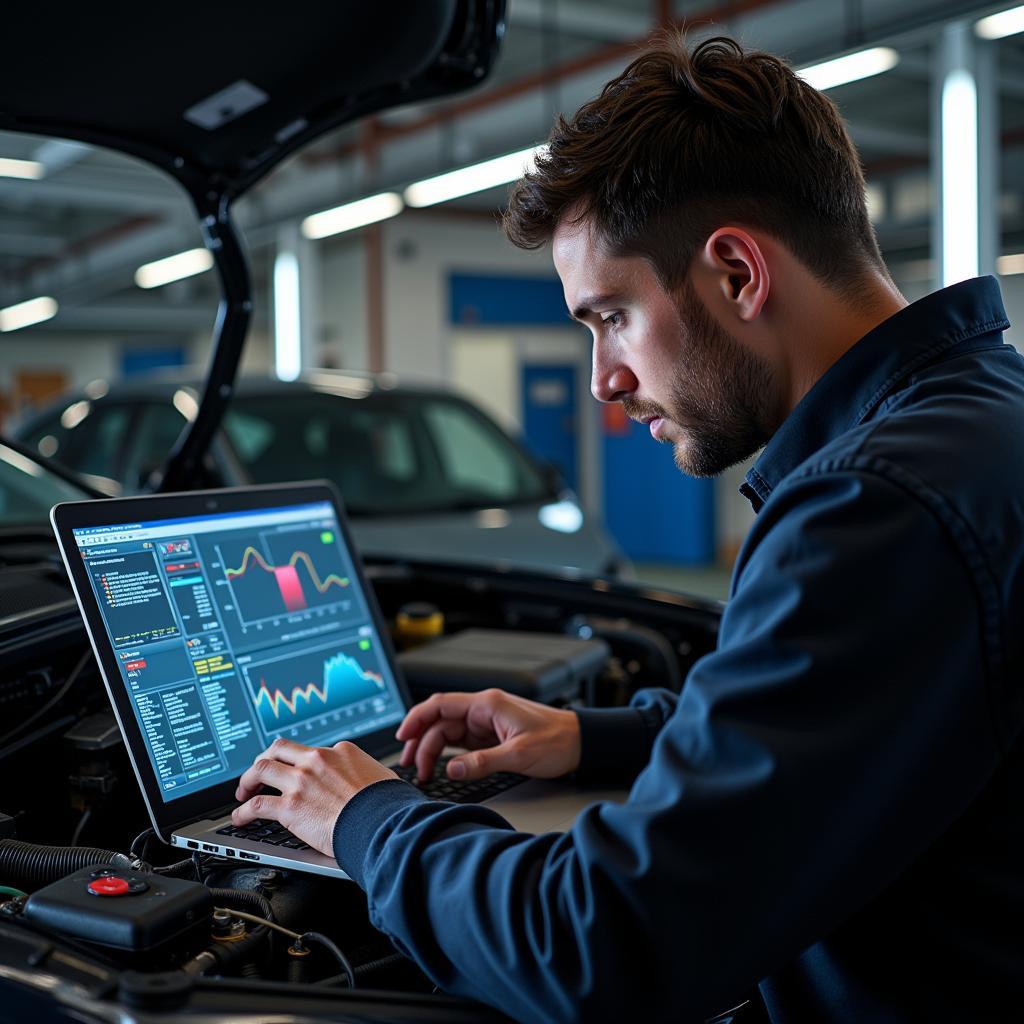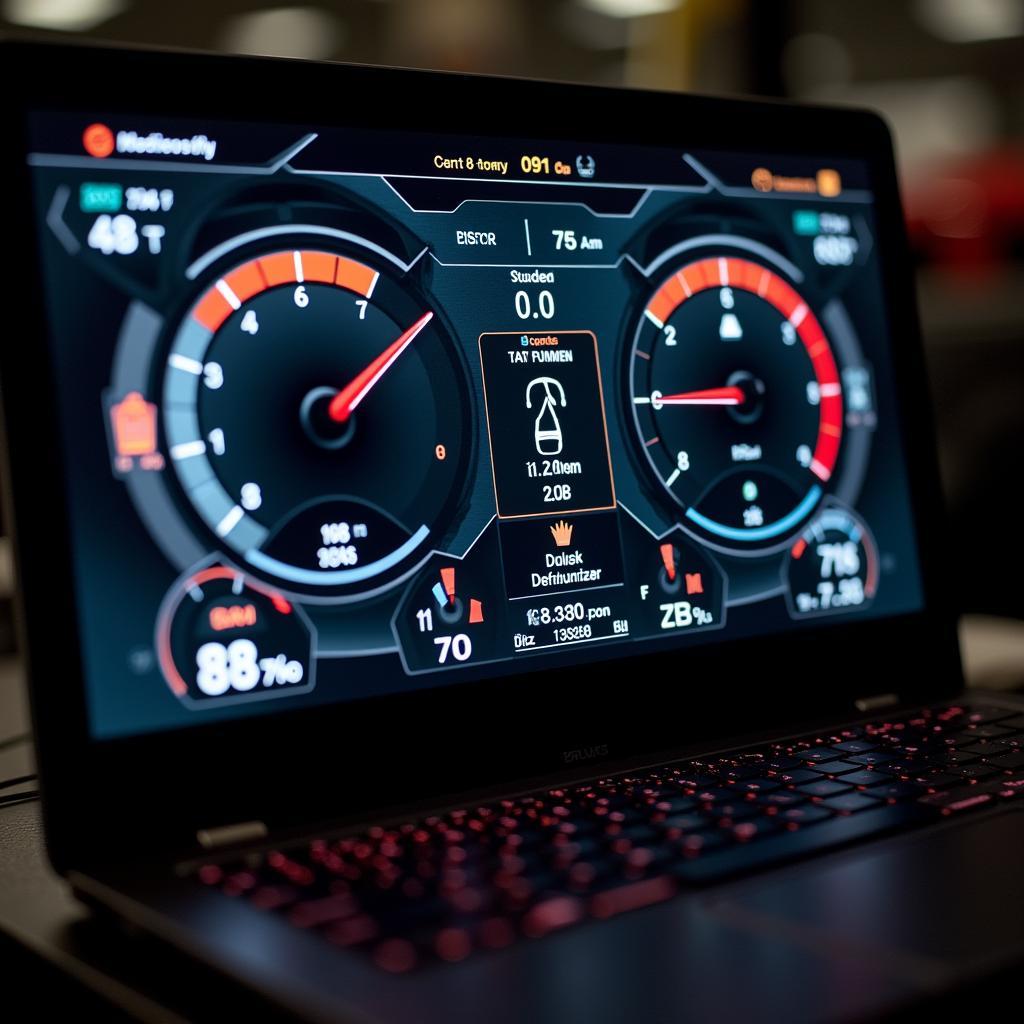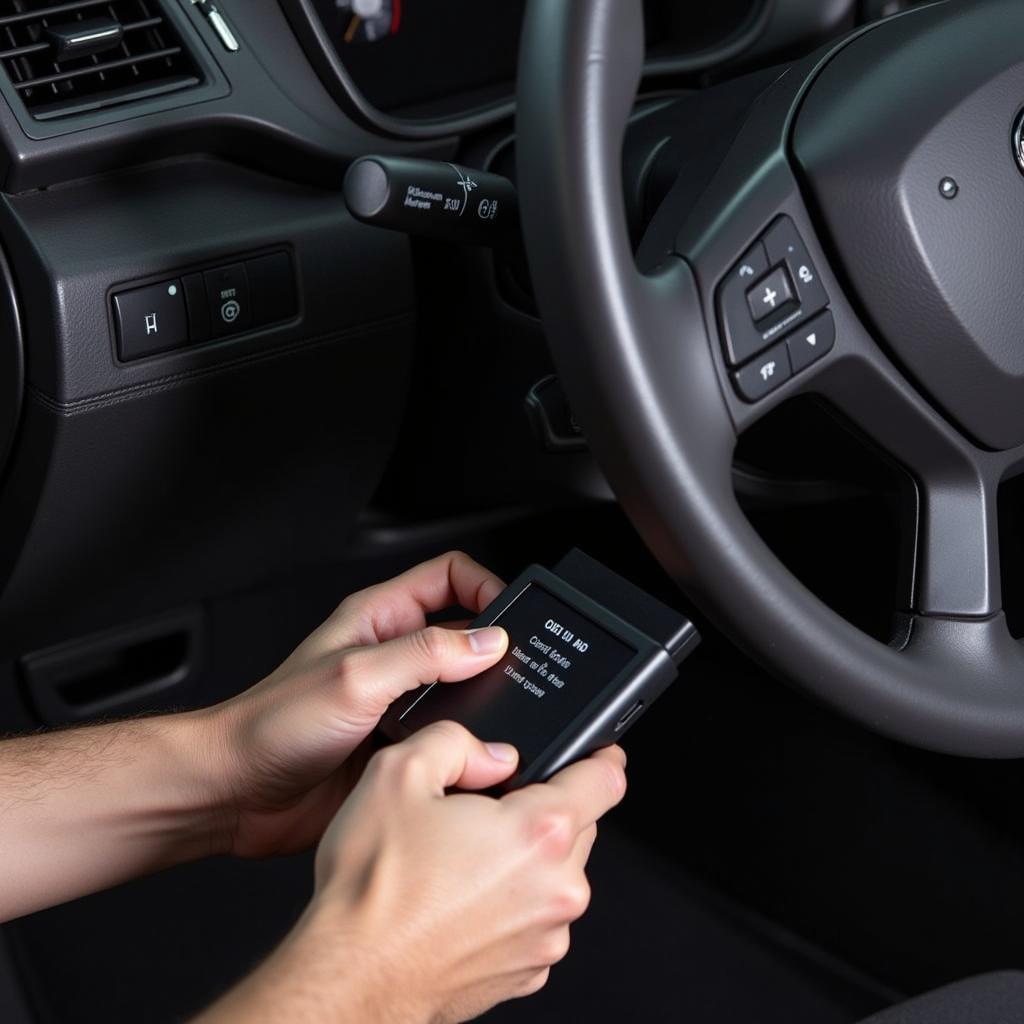In the ever-evolving automotive landscape, car diagnostic software has become indispensable for mechanics, technicians, and even car enthusiasts. But with a plethora of options available, finding the best car diagnostic software for your specific needs can feel like navigating a labyrinth of technical jargon and feature lists.
This comprehensive guide cuts through the noise and provides you with everything you need to know to make an informed decision. We’ll delve into the intricacies of car diagnostic software, explore the top contenders in the market, and arm you with the knowledge to choose the perfect software to unleash your inner mechanic.
Understanding the Power of Car Diagnostic Software
Before we dive into the specifics, let’s take a step back and understand what car diagnostic software is and why it’s become so crucial in the automotive world. Simply put, car diagnostic software acts as a bridge between you and your car’s computer system, allowing you to communicate with its inner workings.
Remember the days when mechanics relied solely on their senses and a handful of tools to diagnose car problems? Those days are fading fast. Modern vehicles are equipped with complex Electronic Control Units (ECUs) that monitor and control various systems. When something goes wrong, the ECU logs a Diagnostic Trouble Code (DTC). Car diagnostic software allows you to read and interpret these DTCs, providing invaluable insights into the root cause of the problem.
Why You Need Car Diagnostic Software
Whether you’re a seasoned mechanic or a DIY enthusiast, car diagnostic software offers a range of benefits that can save you time, money, and frustration:
- Accurate Diagnosis: Say goodbye to guessing games and endless tinkering. Car diagnostic software provides accurate and detailed information about the problem, allowing you to pinpoint the faulty component or system.
- Cost Savings: By identifying issues early on, you can avoid costly repairs down the line. Additionally, you can save money by performing minor repairs yourself.
- Enhanced Understanding: Car diagnostic software empowers you with a deeper understanding of your vehicle’s health and performance.
- Preventative Maintenance: By monitoring various parameters, you can identify potential issues before they escalate into major problems, enabling you to stay ahead of maintenance needs.
 Mechanic using car diagnostic software on a laptop
Mechanic using car diagnostic software on a laptop
Key Features to Consider When Choosing Car Diagnostic Software
Now that you understand the importance of car diagnostic software, let’s explore the key features to consider when making your decision:
1. Vehicle Coverage:
The first and foremost consideration is compatibility. Ensure that the software you choose supports the make, model, and year of your vehicle. Some software options specialize in specific car brands, while others offer broader coverage.
2. Functionality:
Car diagnostic software varies significantly in terms of functionality. Basic software may only read and clear DTCs, while more advanced options offer a wide range of features, including:
- Live Data Streaming: Monitor real-time data from various sensors, such as engine RPM, coolant temperature, and oxygen sensor readings.
- Bi-Directional Control: Interact with and control vehicle systems, such as activating actuators or running tests.
- ECU Coding and Programming: Access and modify ECU parameters for advanced customization and troubleshooting.
- Adaptive Learning Reset: Reset the ECU’s learned values after replacing certain components.
3. User Interface:
The user interface plays a crucial role in the overall experience. Look for software that is intuitive, easy to navigate, and provides clear and concise information.
4. Updates:
The automotive industry is constantly evolving, with new technologies and protocols emerging regularly. Choose software that offers regular updates to ensure compatibility with the latest vehicles and features.
5. Support and Resources:
Technical difficulties can arise at any time. Look for software providers that offer reliable customer support, comprehensive documentation, and helpful resources.
 Laptop screen displaying car diagnostic software interface with various data points
Laptop screen displaying car diagnostic software interface with various data points
Navigating the Maze: Types of Car Diagnostic Software
Car diagnostic software comes in various forms, each catering to different needs and budgets. Let’s explore the most common types:
1. OBD-II Scanners:
OBD-II scanners are handheld devices that plug into your car’s OBD-II port, typically located under the dashboard. They are generally affordable and offer basic functionality, such as reading and clearing DTCs.
2. Mobile Apps:
Mobile apps have gained significant popularity due to their convenience and affordability. They connect to your car’s OBD-II port via a Bluetooth or Wi-Fi adapter and provide a range of features, from basic diagnostics to live data streaming.
3. PC-Based Software:
PC-based software offers the most comprehensive functionality and is typically used by professional mechanics. These software packages require a laptop or desktop computer and connect to the vehicle’s OBD-II port via a USB cable or wireless adapter.
Top Car Diagnostic Software Options
With a plethora of options available, it can be challenging to sift through the noise and find the best fit. Here’s a curated list of top contenders in the car diagnostic software arena:
1. Professional-Grade Software:
- AUTEL MaxiSys Elite: A powerhouse for professional mechanics, the Autel MaxiSys Elite boasts advanced features, extensive vehicle coverage, and a user-friendly interface.
- Snap-on Verus Edge: Known for its reliability and durability, the Snap-on Verus Edge is a favorite among professional technicians. It offers a wide range of features, including bi-directional control and ECU programming.
2. DIY-Friendly Options:
- BlueDriver: BlueDriver is a popular mobile app that offers a balance of affordability and functionality. It provides basic diagnostics, live data streaming, and even allows you to customize gauge layouts.
- OBDLink MX+: The OBDLink MX+ is a Bluetooth OBD-II adapter that pairs with various mobile apps, providing reliable connectivity and access to a range of diagnostic features.
 A mechanic’s hand connecting an OBD-II scanner to a car’s diagnostic port
A mechanic’s hand connecting an OBD-II scanner to a car’s diagnostic port
Choosing the Right Software for You
Now that you have a good understanding of the key features and types of car diagnostic software, how do you choose the right one for your specific needs? Here are some questions to guide your decision:
- What is your budget?
- What make, model, and year is your vehicle?
- What level of functionality do you require?
- Are you comfortable using mobile apps or prefer PC-based software?
- Do you need software for professional use or DIY repairs?
By carefully considering these factors, you can narrow down your options and choose the best car diagnostic software that aligns with your requirements.
Conclusion
Car diagnostic software has become an indispensable tool for anyone who owns or works with cars. From basic OBD-II scanners to advanced professional-grade software, there’s an option available for every need and budget.
By understanding the key features, types of software, and top contenders in the market, you can make an informed decision and unlock a world of automotive knowledge at your fingertips. Remember, the best car diagnostic software is the one that empowers you to diagnose and address car problems effectively and efficiently.
FAQs:
-
Can I use car diagnostic software on any car?
- Car diagnostic software needs to be compatible with your car’s make, model, and year. Check the software’s specifications to ensure compatibility.
-
Is car diagnostic software difficult to use?
- The ease of use varies depending on the software. Mobile apps and basic scanners are generally user-friendly, while professional-grade software might require some technical knowledge.
-
Can I use car diagnostic software to fix my car?
- While car diagnostic software can help you identify car problems, it doesn’t fix them. It provides information that guides you towards the necessary repairs.
-
What is the difference between OBD-II and car diagnostic software?
- OBD-II is a standardized system for accessing vehicle diagnostic information, while car diagnostic software is the application that interprets and displays this information.
-
Do I need car diagnostic software if my car is still under warranty?
- Car diagnostic software can be helpful even if your car is under warranty. It allows you to understand potential issues and have informed conversations with your mechanic.
Need more information on car diagnostic tools and their applications? Explore our other insightful articles:
- Can you rent a car diagnostic scanner?
- Which is the best diagnostic car scanner?
- How much is a diagnostic for a car?
For personalized assistance and expert advice on finding the perfect car diagnostic solution for your needs, don’t hesitate to reach out to our dedicated team. Contact us via WhatsApp: +1(641)206-8880, or Email: [email protected]. We’re available 24/7 to guide you on your journey to automotive mastery.

Leave a Reply